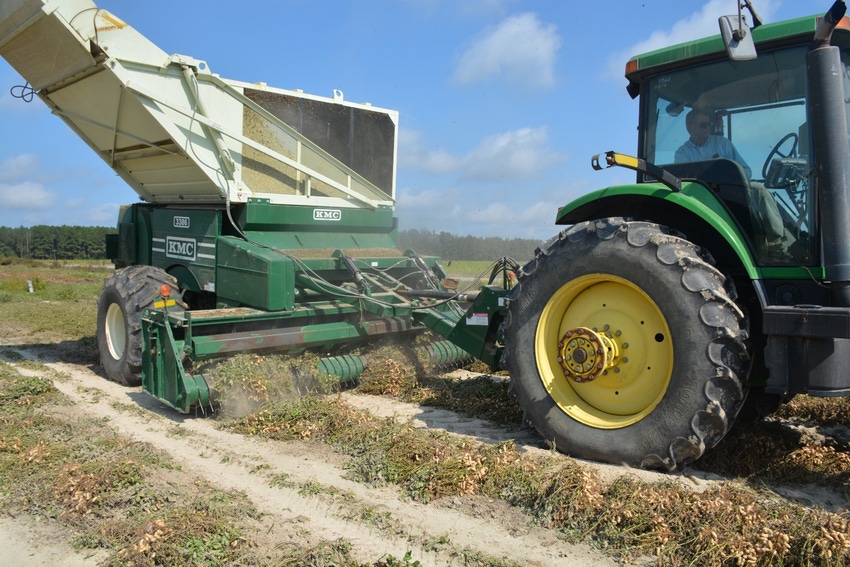
The recent 2022 South Carolina Peanut Growers Meeting brought good news to farmers:
“Last year was a good year for peanuts,” Dell Cotton of the Peanut Growers Cooperative Marketing Association told the group in Santee, S.C. “We had a higher than average yield and the crop was excellent in terms of quality.”
Preliminary reports from the United States Department of Agriculture National Agricultural Statistics Service in Columbia, South Carolina show 66,000 acres were harvested producing 227,200,000 pounds of peanuts in the state last year. Good weather conditions for peanut are touted as the main reason for production increase.
While production was up, so were costs. Nathan Smith, Clemson University Extension professor and agribusiness program team director, said these costs include paying more for inputs.
“Fuel prices were up over the previous year and fertilizer prices doubled,” Smith said. “With these increased prices, a lot of growers are looking at what they can cut to help save money.”
Crop insurance is one item growers should not cut from their budgets, Smith said, adding that the Clemson Extension Enterprise Budgets have been updated to help producers make better decisions.
As for this year’s crop, Clemson Extension peanut specialist Dan Anco suggested several top varieties including; Runner-type peanuts, FloRun331, ,TUFRunnwe297 and Georgia-16HO . Top Virginia-type peanut varieties include: Bailey, Baily II and Walton. The Walton variety is comparable to Bailey II.
“Some Walton variety seed is expected to be available in 2022,” Anco said.
Fungicide should be available
Despite hiccups in the supply chain, Anco said most fungicide products should be available this year. As for charcoal rot, an emerging disease in peanuts caused by the fungus Macrophomina phaseolina, Anco said growers should use mostly cultural practices instead of fungicides to control this disease.
Other presentations included one by a Clemson Extension precision agriculture engineer Kendal Kirk about his research into the impact of ground speed, digger setup and digger subassemblies on peanut yields. Kirk and other researchers have found lower ground speeds decrease losses and maximize profit. Kirk’s group recommends 2.0 mph in Virginia and 2.5 mph in runner-type peanut. They found yield penalties from higher speeds can be almost twice as much in heavy disease conditions. Their work also demonstrated digger inversion assembly, sometimes referred to as starwheel assembly, is responsible for a tremendous amount of yield losses: 900 pounds per acre in one test.
“We ran tests with and without starwheels at different ground speeds,” Kirk said. “Seventy-five percent of losses associated with increased speed were attributed to the starwheel assembly. The results show that improved inversion assembly design can without question significantly decrease yield loss and substantially increase statewide yields and profitability.”
Controlling weeds also can help improve yields. Mike Marshall, Clemson Extension weed scientist, discussed a study using the pre-emergent herbicide Brake. Marshall said Clemson Department of Pesticide Regulation (DPR) is working on a Section 18 request for Brake use in peanut which would allow its use from April through August in 2022 pending EPA approval. He also spoke about using Anthem Flex systems to control Palmer amaranth.
“We found using Anthem Flex as a pre-emergent and post-emergent worked very well to control Palmer amaranth,” Marshall said.
S.C. peanut industry growing
The peanut industry in South Carolina is growing. Karl Zimmer, chief executive officer for Douglas, Georgia-based Premium Peanut LLC, was at the meeting to talk about plans for his company to establish operations in Orangeburg County. The $64.3 million investment announced in September is expected to create 130 new jobs.
“Premium Peanut is proud of the value we have been able to create for over 400 grower-owners, in addition to providing quality products to customers around the world,” Zimmer said. “We are excited about expanding our operations and establishing our footprint in South Carolina.”
Portions of the new facility are expected to be operational this spring. Growers interested in learning more should contact the Palmetto Peanut Buying Point. Individuals interested in joining the Premium Peanut team should visit the company’s careers webpage. Premium Peanut’s customers consist of the major snack, candy and peanut butter manufacturers domestically, as well as customers in more than 30 countries around the world.
South Carolina Commissioner of Agriculture Hugh Weathers said this new venture will “open more doors” for South Carolina products.
“We are pleased Premium Peanut has chosen to locate in South Carolina,” Weathers sid. “We’re thrilled at the chance to expand peanut production in the state and welcome Premium Peanut��’s investment in our state’s future.”
Weathers also encouraged South Carolina producers to apply for the South Carolina Agricultural Tax Exemptioncard and to attend the Certified South Carolina Showcase March 14-15 at the Columbia Metropolitan Convention Center.
“This event will provide an excellent networking opportunity for producers,” Weathers said.
Activities planned for the Showcase include a trade show, a luncheon featuring honored guests and an update on South Carolina agriculture, as well as educational sessions. For information, go to https://bit.ly/CSCS2022.
Source: Clemson University, which is solely responsible for the information provided, and wholly owns the information. Informa Business Media and all its subsidiaries are not responsible for any of the content contained in this information asset.
About the Author(s)
You May Also Like






